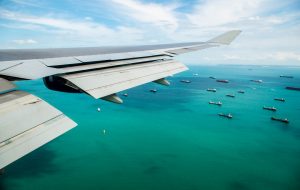In addition to Indonesia’s recent and well-publicized frictions with China around the Natuna Islands, Indonesia has an active border dispute with Malaysia that is yet to be resolved. The main sticking point is the overlap of maritime territorial claims between the two countries, in resource-rich waters that are also important to international navigation. One of the most pressing issues that needs to be addressed by Indonesia is to protect its sovereignty over Karang Singa and its surrounding waters.
Karang Singa, also known as Carter Rif or Carter Shoal, is a tiny shoal of rock situated in Indonesian territorial waters just north of Bintan Island in the Singapore Strait, a short distance from the disputed low-tide elevation of South Ledge, which is claimed by Singapore and Malaysia. Karang Singa is not only located just to the north of South Ledge; it is also close to Pulau Batu Puteh (Pedra Blanca) and Middle Rocks, all three of which have been the subjects of territorial disputes between Malaysia and Singapore.
Possession of the disputed Pulau Batu Puteh, Middle Rocks, and South Ledge between Malaysia and Singapore was settled by a ruling of the International Court of Justice (ICJ) in 2008. The ICJ ruled that Singapore has possession of Pulau Batu Puteh and Malaysia has possession of Middle Rocks. However, the possession of South Ledge belongs to the country that has sovereignty over the territorial waters in which it is situated. South Ledge is a low-tide elevation land mass, which is completely submerged at high tide, yet nonetheless has significant strategic value for Indonesia from a defense and security perspective, given its proximity to the borders of Malaysia and Singapore.
Geographically, South Ledge is located slightly closer to Indonesia, with only 5.46 nautical miles separating it from Bintan Island. Article 13 (1) of the United Nations Convention for the Law of the Sea (UNCLOS) stipulates that low-tide elevations could function as a baseline from which to measure a nation’s territorial waters. Therefore, if Malaysia took possession of South Ledge, then Indonesia would lose some of its territorial waters in the area: a slice of up to 2.96 nautical miles, if the distance between South Ledge to Bintan Island was split evenly. This would allow foreign vessels to sail much closer to Bintan without needing Indonesia’s approval or authorization. This makes it imperative for Indonesia to increase efforts at securing what is considers its territorial possessions in the area.
In order to achieve this, Indonesia should immediately measure its territorial waters using Karang Singa as a baseline, in accordance with Article 13 (1) of UNCLOS, and deposit the resulting territorial map at the United Nations in order to publicize its maritime territorial claim in the area. Indonesia must also undertake efforts to ensure there will be practical and effective occupation of the area by building a navigation aid structure on Karang Singa, running naval and aerial patrols, organizing military exercises, conducting hydrology or other academic researches, completing land reclamation, and endorsing other economic activities such as fishing and tourism to satisfy the “effective occupation” principle of international law. Indonesia must also encourage cooperation between the local government and private sector in research and commercial activities as an important part of an effective campaign of protecting its sovereignty over the territorial waters in which Karang Singa is located.
If the Indonesian government was fully committed to its territorial claim over Karang Singa and its surroundings, it would need a coherent and consistent approach to securing it. This would requiring sufficient allocation of resources to mount an effective occupation campaign. In other words, Indonesia must make its outermost islands a policy priority, taking a whole-of-government approach to their protection.
Indonesia cannot afford to waste any more time in taking these measures to safeguard its sovereignty over Karang Singa and its surrounding territorial waters, including South Ledge. Otherwise, Indonesia runs the risk of having its neighbors expand their territories at the expense of its own sovereignty.
Beni Sukadis is senior researcher at the Indonesia Institute of Defense and Strategic Studies (LESPERSSI) in Jakarta. His field of interest includes defense policy, international security, and security sector reform.
Jundi Jaadulhaq is fellow researcher at LESPERSSI. He mainly focuses on international law and Indonesian politics.

































